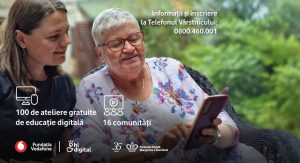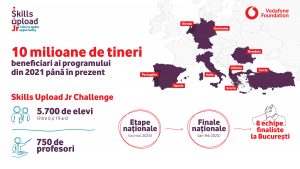In an village from Ialomita, where an afterschool was built for the vulnerable children, a mother told the members of the association who were in charge of the project: “Why should you offer him a hot meal? Can’t I do that as well?”
Those who heard these words were going to find out soon after that she came from the poorest family in the whole community. What was going on here then? Was a mother feeding her pride with the risk of letting her child starve? Daniela Buzducea, CEO of Word Vision Romania, thinks this is about something else, this is simply fear.
“She was most likely afraid of being judged by the others. A fear rooted in experience, in years of social rejection”, she says. Poverty does not simply resume to lack of food, clothes, or money.
Poverty means you’re cold and your feet are wet because your boots are torn, and the others reject you and point their finger at you because your boots are worn out. Poverty means you cannot afford food, and because you’re starving, you cannot study either.
40% of the Children in the Rural Areas Spend over Two Hours Working in the Farm
“It is very rare that a vulnerable child is vulnerable in only one way”, remarked Daniela Buzducea.
This month, World Vision Romania is getting ready to publish a study on the welfare of children in the rural areas in Romania. According to it, 8.6% of the children in the rural areas go to bed hungry, 40% spend over two hours working in the household, 8% skip school to go to work. At the same time, the study shows that those children who fare poorly at school face the risk of being treated worse by their colleagues and teachers. Daniela Buzducea thinks the access to quality afterschool programs represents one solution that may change a child’s life . So, with the help of the Vodafone Romania Foundation, World Vision Romania financed community organizations to carry on afterschool programs in five localities in the Ialomita, Valcea and Dolj Counties.
At the afterschool, the children engage in recovery activities helping them bridge the educational gap, do homeworks, socialize, and play confidence-building games that foster relationships with the people around them more easily.
“I am so happy I cannot stop smiling.”
“A month after school had started, I went on an assessment mission and I couldn’t believe how relaxed the children were; it is true they were accompanied by dedicated teachers. I asked a little girl how she was and she said “I’m so happy I cannot stop smiling”, recounts Maria Malureanu, project coordinator. Compared to the silence during classes in the Romanian schools, she first thought this was a chaos.
“I realized this was a very well organized chaos. There were two teachers. On one side, they were learning Romanian and practicing spelling. On the other side, they were learning mathematics, and solving exercises. There was this girl with special education needs, she was learning how to write and she had started to write with magnetic letters. Other little girls were thrilled about a story they had read and now they were putting on a play and they wanted us to watch. The children are excited about these after schools, as they are boosting their self-esteem. The relationships among themselves are getting stronger differently”, says Maria Malureanu.
Around 150 children are benefiting from the afterschool programs in five communities. Most of them have very difficult family backgrounds, such as the case of a little boy from Dolj, who lives with his family in a small house and goes through the trash to earn a living. Initially he had dropped out of school, then the teachers had managed to bring him back, but now he goes to school only now and then. And yet he goes to the afterschool on a daily basis, recounts Maria Malureanu.
„Just providing social benefits does not put an end to a family’s living in poverty.”
The children included in the program come from very poor or from single parent families, or are forced to work, sometimes all these at the same time. In other case, children come from families where a member is severely ill, or experience domestic violence at home, although this situation does not reflect in their school results. There are countless ways a child can become vulnerable.
“Children who attend the afterschool skip fewer classes. Then, these children practically improve their reading and writing skills. The one thing making the difference in a country whose illiteracy amounts to 40% is the winning approach. When you give a chance to these children from rural areas, they are aware of it and return the favour. They simply bloom”, says Daniela Buzducea.
An integrated approach is the key for these children. “Each community must have a social assistant, a person who is not only involved in the paperwork, but who can also go to the community, assess its vulnerability and try to provide those services to the vulnerable families. Simply providing social benefits does not put an end to a family’s living in poverty, we have seen this for decades, but it rather fosters a quite dangerous dependency on the state. This covers also the models it promotes to the children. The integrated approach must take into account health, education and economic development”, she believes.
Source of article: https://republica.ro/iata-ce-s-a-intamplat-cu-150-de-copii-necajiti-de-la-tara-dupa-ce-in-satul-lor-a-aparut-zun-afterschool




